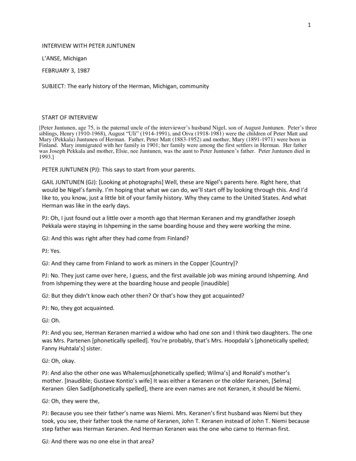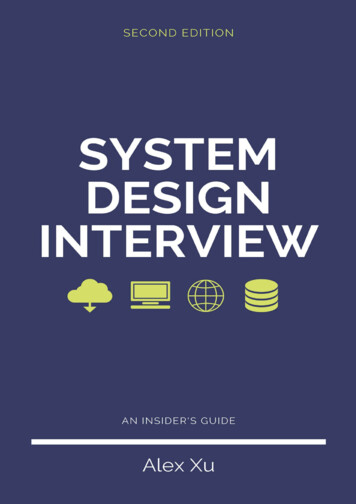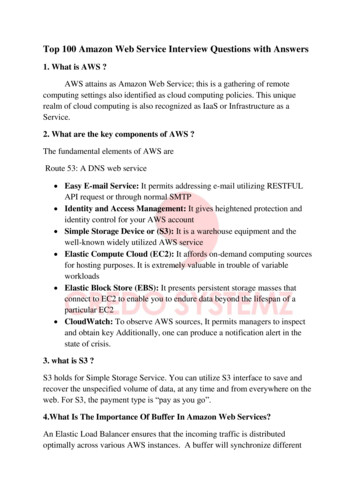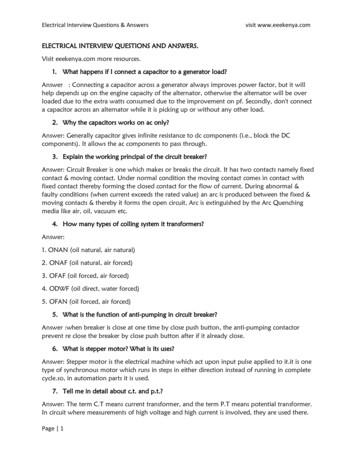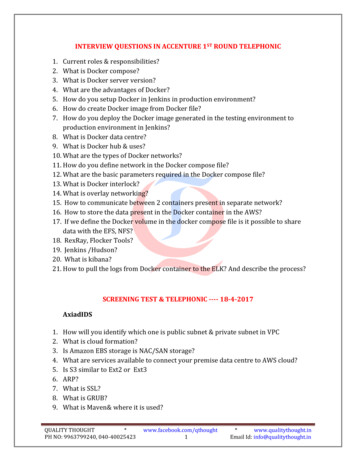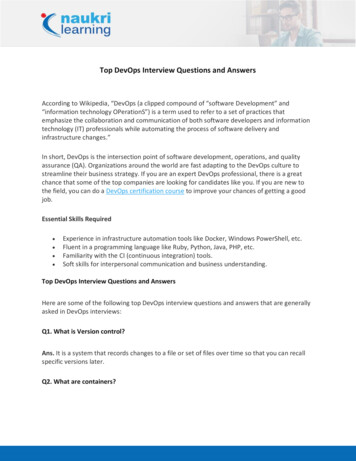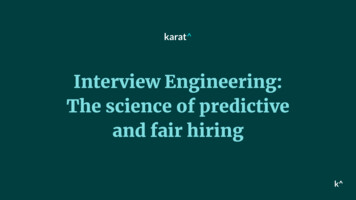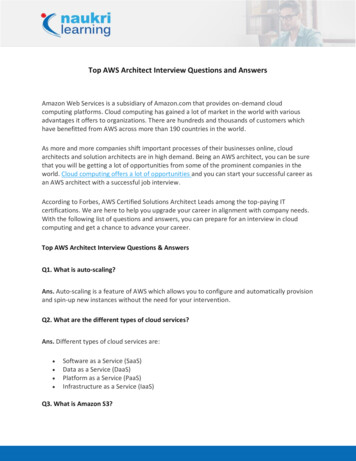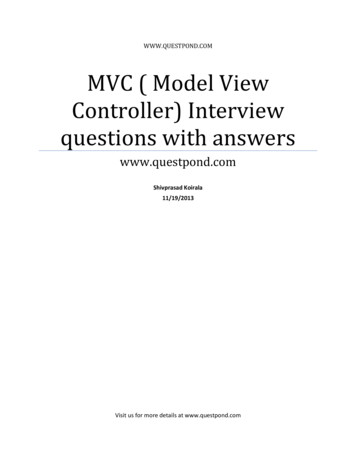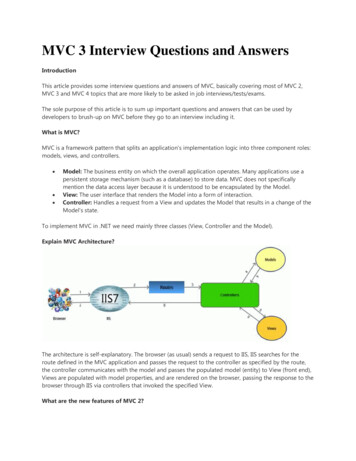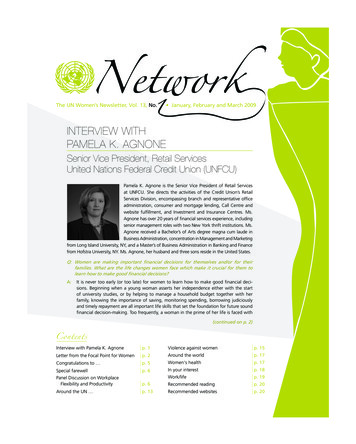
Transcription
The UN Women’s Newsletter, Vol. 13, No. t BOVBSZ 'FCSVBSZ BOE .BSDI Interview withPamela K. AgnoneSenior Vice President, Retail ServicesUnited Nations Federal Credit Union (UNFCU)Pamela K. Agnone is the Senior Vice President of Retail Servicesat UNFCU. She directs the activities of the Credit Union’s RetailServices Division, encompassing branch and representative officeadministration, consumer and mortgage lending, Call Centre andwebsite fulfillment, and Investment and Insurance Centres. Ms.Agnone has over 20 years of financial services experience, includingsenior management roles with two New York thrift institutions. Ms.Agnone received a Bachelor’s of Arts degree magna cum laude inBusiness Administration, concentration in Management and Marketingfrom Long Island University, NY, and a Master’s of Business Administration in Banking and Financefrom Hofstra University, NY. Ms. Agnone, her husband and three sons reside in the United States.Q: Women are making important financial decisions for themselves and/or for theirfamilies. What are the life changes women face which make it crucial for them tolearn how to make good financial decisions?A:I t is never too early (or too late) for women to learn how to make good financial decisions. Beginning when a young woman asserts her independence either with the startof university studies, or by helping to manage a household budget together with herfamily, knowing the importance of saving, monitoring spending, borrowing judiciouslyand timely repayment are all important life skills that set the foundation for future soundfinancial decision-making. Too frequently, a woman in the prime of her life is faced with(continued on p. 2)ContentsInterview with Pamela K. AgnoneLetter from the Focal Point for WomenCongratulations to Special farewellPanel Discussion on WorkplaceFlexibility and ProductivityAround the UN p. 1 p. 2 p. 5 p. 6Violence against womenAround the worldWomen's healthIn your interestWork/life p. 6 p. 13Recommended readingRecommended websites p. 15 p. 17 p. 17 p. 18 p. 19 p. 20 p. 20
(continued from p. 1)assured” and in this way be best prepared for life’sunpleasant surprises.unforeseen circumstances, such as the death of apartner or spouse, a divorce or even the loss ofemployment. The stress of these particularly difficult situations is further compounded by a lackof knowledge about how the household expensesare paid, mounting credit card debt or the complete absence of a financial plan. It is imperativefor women to take advantage of all available resources to become effectively “financially self-Q: What financial strategies could you impart towomen during the current economic situation?A: Remain positive and take action. Strategies rangefrom simply getting a better grip on your routinespending habits, establishing a systematic savings(continued on p. 3)Letter from the Focal Point for WomenWelcome to our first 2009 quarterly issue of Network. In this issue we bring you information that wehope will assist and encourage your own efforts as advocates of gender equality.First, in view of the current global economic crisis, this office interviewed Pamela K. Agnone, SeniorVice President, Retail Services of the United Nations Federal Credit Union. She enlightens withpractical ways of dealing with our finances. It is with pride that we feature her as a female leader inthe financial field, inspiring us with her thoughts, experiences and lessons learned as she rose up theladder in a male-dominated career.Second, because competitiveness becomes an increasing concern in tough economic times, youwill find a summary of the panel discussion on flexibility in the workplace, organized to celebrateInternational Women’s Day 2009. The panelists stressed that experience across industry almostunequivocally bears out the benefits to productivity, work/life fit and retention of flexibility in theworkplace for both the employee and the employer. Consequently, the current trend is to removeflexible work options from the realm of perks to that of a routinely available work method part ofessential business strategy.Also interesting is a summary of the round-table discussion of “Equal Participation of Women and Menin Decision-Making Processes” hosted by Ms. Rachel Mayanja, Assistant Secretary-General, Office ofthe Special Adviser for Gender Issues and Advancement of Women, in preparation of InternationalWomen’s Day. We highlight the messages of the speakers—from the good practices promulgatedby Rwandan women after the genocide to other ways in which progress in decision-making can beaccelerated. Also, the panel featured the human interest story of an Indian woman who freed herselfthrough her persistence from the rigid family tradition going on to attain an education and dream ofways to empower other women.Finally, this issue contains a piece on a newly created UN database on violence against women as wellas an article on “Men join campaign to end violence against women” by Stephanie Urdang.Ms. Urdang wrote the article for the United Nations Africa Renewal magazine. Secretary-GeneralBAN Ki-moon stated during International Women’s Day, “violence against women is an attack onall of us, on the foundation of our civilization”. We cannot accept that women suffer violence andmust join hands to eliminate it. Please join in advocacy against it.Enjoy our first 2009 issue of Network.In solidarity,Aparna Mehrotra2
Interview with Pamela K. Agnone (continued from p. 2)financial advisor can recommend the best course ofaction. Financial planning is not merely investing;it incorporates systematic saving, risk management,long-term care insurance considerations, insuranceneeds, estate planning and tax advice. A trustedfinancial advisor may be an expert at one or more ofthese programmes and will also have ready accessto an extensive network of professionals within aparticular area of expertise.plan to build an emergency cash reserve andscheduling time with your financial advisor to reviewyour financial plan. In my household, in additionto routine payments such as our mortgage and carpayments, we have college and high school tuitionpayments for three sons, which will be increasing inthe near term as our two younger sons finish highschool and join their older brother at university. Ididn’t necessarily panic as the stock market continuedits rapid descent, but I did review our householdspending patterns and looked for ways to cut back. Ialso heard with frequent regularity from my UNFCUFinancial Advisor, who also suggested ways to takesome defensive actions while not deviating materiallyfrom our overall financial plan.Q: What attributes do you bring as an effectivefemale leader in the financial sector?A: Looking back over the course of my 25-year career infinancial services, I think the professional traits thathave served me well include expressing my point-ofview while taking the time to listen and consider theopinions of others when taking a decision, askingquestions to gain insight and understanding, sensingthe unique interests and needs that motivate variousindividuals and incorporating that information intomy managerial style. I also enjoy a challenge and willwork hard to achieve the desired result. I think I havetaken juggling the work/life balance to an art formand, as a result, I am greatly aware of the pressuresof working full time, traveling extensively and raisinga family. I appreciate the sacrifices staff makes towork the hours needed for the Credit Union to runsmoothly, but I also do not like to see anyone burnout. My perspective then takes that into considerationwhen managing staff.To get a really good picture of your spending habits,I suggest keeping a journal of all your spending for aperiod of one month and review it with your monthlycredit card and account statements. Consider whatare routine spending items, such as groceries,mortgage loan payments/rent, and childcare andalso what are impulse purchases. Ask yourself, didI really need to join the gym, or can I exercise athome? Do we have to eat out at restaurants severaltimes a week? If you had not, how much moneywould you have saved? In difficult economic times,the potential is high for a partner in the household tolose their employment. To manage your householdbudget effectively and withstand the loss of incomefor what could be several months, it is best to havea cash reserve equal to at least 6 months of yourmonthly household obligations. Establishing asystematic savings plan where a set amount thatyou determine is automatically deposited into aseparate savings account should start immediately.The financial services sector is currently transformingitself right before our eyes. Social networking,such as blogs, podcasts and YouTube, as a modefor information gathering and as a means ofinfluencing consumer behaviour is significant,particularly among our younger members. The paceof technology as a vehicle to move and managefunds is staggering. The attributes that have servedme well in the past are changing and keepingup-to-date with current trends in each of theseareas is essential and challenging. To this end, mysons found it oddly curious when I recently joinedFacebook and invited them to be my friend. I’veonly gotten one of the three to accept, but I’m stillworking on the other two.Today’s global financial markets are particularlyvolatile, making it even more difficult for commoninvestors to know what action to take—if any atall. Working with an experienced financial advisoris critical to preserving your investment assets andachieving your life goals. A financial advisor canmeet with you initially to understand your longrange goals, your appetite for risk and help yougauge current market events and their impact onyour plan. Developing a relationship with the advisortakes more than just one meeting and you mustcome prepared with account statements and otherrelated documentation so that the advisor can dothe job well for you. A comprehensive financial plantailored specifically for you should be the outcomeof your meetings. Based on your particular plan, theQ: How can women educate themselves aboutinvestments?A: A first step would be to arrange a meeting with afinancial advisor. Attend educational seminars providedby your credit union or other financial institutions (ifoffered). Read the business section of the Wall Street3
is considered in order to maintain the gender balance.About one-third of the senior management ranks atUNFCU is comprised of women and five years agothis figure was 25 per cent. Women manage ourRepresentative Offices in Vienna and Nairobi, as wellas the UN Secretariat Branch in New York. All of themarrived at their current level through hard work, acommitment to the Credit Union and its membersand continuously learning.Journal or other business periodicals. Subscribe forfinancial news eAlerts, review Yahoo Finance andnetwork with your colleagues in finance.Q: Could you share with our readers some lessonsin leadership in the financial area? Are theredifferent ways of developing male/femaleleaders?A: I have been described by staff (male and femalealike) as “tough, but fair” and I am content withthat. The “tough” part to me means setting highstandards and managing people to achieve thedesired result. I have a team of extremely wellqualified and committed managers who truly desireto serve our membership in the best way possible.So, I start with a group that believes in the missionand enjoys carrying out the initiatives supportingUNFCU’s strategy. The hardest and most importantdecisions I make are in fact hiring decisions.There are plenty of candidates with the requisitetechnical experience, but are they “hard wired”to deliver exceptional service? Do they have or arethey capable of maintaining a “global context”for service and are they results oriented? A hiringdecision particularly in the management ranks haslong-term implications. Don’t settle; continue thesearch for the right person.Q: During your career at UNFCU did you experiencea glass ceiling? If so, how did you manage toovercome it?A: I just celebrated my 10th year anniversary withthe Credit Union. So much has changed over thepast decade with the opening of RepresentativeOffices in Geneva, Nairobi and a third in Rome tocomplement our office in Vienna and the rapidgrowth of members and staff to best meet the needsof our members. With heartfelt honestly, I can saythere was never any glass ceiling I had to break. Iadvanced early and was given many opportunitiesover the years to develop professionally. I continueto learn. The work environment at UNFCU is of theutmost in professionalism. Considering my entirecareer, spanning several organizations, I admireand respect my Credit Union colleagues most ofall. Do we always agree on everything? No, ofcourse not. But the environment is such that youcan express yourself, be heard and influence anoutcome. I suppose if ever I were in a situationwhere I perceived that my opportunities forprofessional development and upward mobilitywere restricted, I would first try objectively toassess my skills and contributions versus my peers,identify any gaps and work towards filling themeither by volunteering to take on a new projectfor the experience or becoming more educatedabout a particular subject matter. I believe themost important course of action is to have openand honest dialogue with your manager to explainyour willingness to take on more or differentresponsibilities and to receive constructive feedbackabout what could be holding you back.I do not believe there are stereotypical ways ofdeveloping male or female leaders. People are uniqueindividuals and I have learned through the yearsthat each person will be motivated differently. Somepeople are quietly effective and are uncomfortablewhen the limelight is cast upon them, others requireheaps of praise, the more public the better—but,no matter the means, all people like to know whenthey are doing a good job and most would ratherknow early and constructively why they mightbe missing the mark. With the level of expertise,knowledge and commitment of our team, I findthat empowering individuals to make decisions fortheir business unit and being held accountable forthe results is most important.Q: What are your views regarding equalparticipation of women and men in economicdecision-making processes and positions?Q: Why do you think women in leadershippositions, i.e., in the finance area, make adifference in the working environment? Howdo you feel about mentoring and training inadvancing women’s careers?A: My view is that if you are a stakeholder, you shouldhave a voice and be able to influence the decision.I think an organization should strive for genderbalance but not at the expense of selecting the mostqualified individual for a position. This may mean thatthe search takes longer or that a bigger investment incareer development for qualified internal candidatesA: I do think women in leadership positions make adifference in the work environment since they canbe vocal, express a different point of view and4
increase sensitivity around work/life balance for allfamilies. Issues such as telecommuting, child andelder care are frequently championed by femalesin an organization. These benefits are extended toall and the entire organization can participate. (Wehave seen that work quite effectively at UNFCU.)In many dual-income households with children,although the parenting is shared, frequentlythe primary responsibility for interacting withteachers, caregivers, pediatricians, Parent TeacherAssociations and the like falls to Mom. Workingmothers in leadership roles are sensitive to the timethese activities take and can allow for more flexibilityfor staff—male or female—to balance these familyneeds with work demands.deal of personal satisfaction from my career andI have made some personal tradeoffs and sacrificesalong the way, but what gives me the greatestpleasure is that delicate balance between workand raising three sons who will come into the workplace with a much different perception of whattheir female colleagues are quite capable of undertaking . . . and realizing. They know because theywatched their mom. Congratulations To New Zealand’s former Prime Minister Ms. HelenClark’s nomination by Secretary-General BANKi-moon as the Administrator of the UnitedNations Development Programme (UNDP) fora four-year term following consultations with theExecutive Board of UNDP. Helen Clark has been amember of the Parliament of New Zealand since1981 and was the country’s Prime Minister from1999 to 2008. She has been a leader in her country on economic, social, cultural and environmental issues and international relations. A vigorousadvocate of the Millennium Development Goals(MDGs), she has supported her country’s biodiversity, health care and gender equity in employment.Mentoring applies to all staff members—not justfemales—that are willing to commit the time andenergy towards advancing their careers. A juniorstaff member can receive constructive feedbackand learn to emulate positive behaviours for desiredresults. I would encourage staff to seek out anetwork of colleagues or senior staff members whoare well perceived in the organization and who areeffective. For the price of a cup of coffee, you canlearn more about organizational politics, the bestway to construct your business case or how to get agood idea put into a formal plan for action.Through networking and mentoring, women canlearn about the resources available to them tobecome financially fit and independent. Ambassador Sylvie Lucas of Luxembourg for herelection on 15 January 2009 as the 65th Presidentof the United Nations Economic and SocialCouncil (ECOSOC). She becomes the secondfemale President of the 54-member body. Duringthe opening of the organizational session ECOSOC,Ms. Lucas emphasized the need to strengthen thequality of the Council and to achieve more relevantwork on development. She also called for a moreaction-oriented Council.Q: You continue to work in an environment thatis mostly masculine. How does this genderimbalance define the paradigm? How should itbe changed to suit women better?A: While I may work in an environment that is mostlymasculine, the corporate culture of the CreditUnion is one which values and embraces all formsof diversity. Interestingly, I have observed whenthere is a lack of gender diversity either way in adepartment it detracts from the effectiveness of thegroup overall. The best model for women to followis one that incorporates gender diversity at all levelsand creates an environment where women feelconfident to express their views in a professionalway in order to be heard and recognized. M s. Karin Landgren (Sweden) for her appointmentas the Secretary-General’s Representative inNepal and Head of UNMIN on 3 February 2009.She will start heading the Mission at the endof Ian Martin’s assignment (the current SpecialRepresentative of the Secretary-General in Nepal)and the adoption of Security Council resolution1864 (2009). Ms. Langren has had a long career inthe UN in the fields of politics, management andinternational law. She has been the Deputy SpecialRepresentative of the Secretary-General in NepalQ: What advice would you give to other women andwhat gives you the most personal satisfaction?Speak up, ask questions, seek advice—fromcolleagues or other professionals—and take chargeof your financial affairs. Do not over analyse issues,go with what you know and take advice from othersyou trust who are experienced. I have drawn a great5
Panel Discussion onWorkplace Flexibilityand Productivitysince September 2008. She also served UNHCR ascountry representative to Eritrea, Singapore andBosnia and Herzegovina as well as UNICEF’s headof Child Protection. Academy Award–winning actress Mira Sovinofor her appointment on 12 February 2009 asthe United Nations Office on Drugs and Crime’
United nations Federal Credit Union (UnFCU) (continued on p. 2) The UN Women’s Newsletter, Vol. 13, No. t BOVBSZ 'FCSVBSZ BOE .BSDI . are pai
